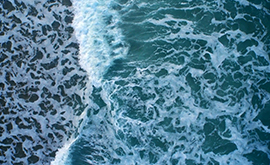NACWA Talks Emerging Salinity Issues with EPA
 (March 21, 2018) - NACWA and a number of members – including representatives from Texas where utilities are facing major permit challenges – met with key EPA staff on March 15 to discuss how the growing trend in surface water salinity impacts the municipal clean water community. Recently, a peer-reviewed study in the Proceedings of the National Academy of Sciences applied U.S. Geological Survey data and found that there is a growing, national trend in freshwater salinization. Road salt application, water reuse, desalination, water softeners, and high natural background levels can contribute to greater salinity in surface waters.
(March 21, 2018) - NACWA and a number of members – including representatives from Texas where utilities are facing major permit challenges – met with key EPA staff on March 15 to discuss how the growing trend in surface water salinity impacts the municipal clean water community. Recently, a peer-reviewed study in the Proceedings of the National Academy of Sciences applied U.S. Geological Survey data and found that there is a growing, national trend in freshwater salinization. Road salt application, water reuse, desalination, water softeners, and high natural background levels can contribute to greater salinity in surface waters.
Because publicly owned treatment works (POTWs) were not designed to treat for this constituent, and due to the expensive costs and energy intensive process to remove it, NACWA continues to advocate for regulatory flexibility and water quality standards that are based on appropriate uses. For one member in Texas, requirements to address salinity levels led to shutting down an entire treatment plant.
EPA was in the process of updating its criteria for chloride – which would have provided a more rational approach – but that work was put on hold while the Office of Research and Development continues researching the complex ion interactions and aquatic life toxicities. NACWA will continue to engage with EPA on this issue, in part through its work with the Association’s Arid States and Water Quantity Workgroup.
Please contact Emily Remmel, NACWA’s Regulatory Affairs Director, for more information.